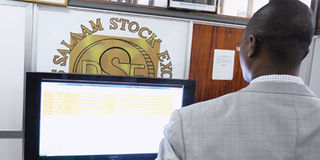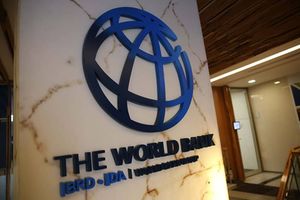Dar bourse feels pinch of global turmoil, BoT steps

A man follows an electronic trading session at the Dar es Salaam Stock Exchange. PHOTO | FILE
What you need to know:
- During last week’s trading, the DSE’s total turnover was Sh680.56 million. This was 56.4 percent lower than the Sh1.5 billion that was registered the week ending April 7
Dar es Salaam. Turnover at the Dar es Salaam Stock Exchange (DSE) has been low during the past few week, subdued by low participation of foreign investors, market data shows.
For instance, during last week’s trading, the DSE’s total turnover was Sh680.56 million. This was 56.4 percent lower than the Sh1.5 billion that was registered the week ending April 7.
Last week’s turnover was also over 60 percent less than the Sh1.72 billion posted in the last week of trading for the month of March, 2023.
Analysts say with the ongoing global economic turmoil, many frontier fund managers have adopted the 'wait and see' approach.
“The US Federal Reserve's tendency to raise rates and make the US Dollar more expensive and scarce is a potential reason for this,” said the capital markets manager at Vertex International Securities Ltd, Mr Ahmed Nganya.
This, he said, has hugely discouraged investors from participating in frontier markets such as the local DSE.
“The banking turmoil, which led to the collapse of SVB and ending 167 years of Credit Suisse’s history poured more salt into the deep wounds of depressed markets,” he said.
Locally, he said, the Bank of Tanzania adopted contractionary monetary policy through increasing rates, which fueled asset class wars between equities and fixed income. “As a result, long-term maturity instruments became cheaper and cheaper attracting more local investors’ money and in turn, stifling equities liquidity,” he said.
However, Mr Nganya said there were some outliers such as local financial counters like CRDB Plc and NMB Plc which kept on surging to defy the odds.
For instance in last week’s trading, CRDB was a top market mover, recording 71.21 percent of the total market turnover while NMB came second with 10.57 percent as TCCL came third with 6.8 percent.
“Domestic investors have been driving the market since the start of this year. However, it is no secret that our market largely depends on foreign investors for liquidity. As a result, their low participation always ends up hurting the bottom line performance,” said Nganya.
In last week’s performance, price movements were also down as Tanga Cement Company Limited (TCCL) was the top losing counter closing at Sh1,000 which was 15.25 percent down. It was followed by MBP which closed at Sh365, being 7.59 percent down while DCB closed at Sh165 which was 2.94 percent down.
As a result, the total market capitalization decreased to Sh15.61 trillion a 0.96 percent decrease.




